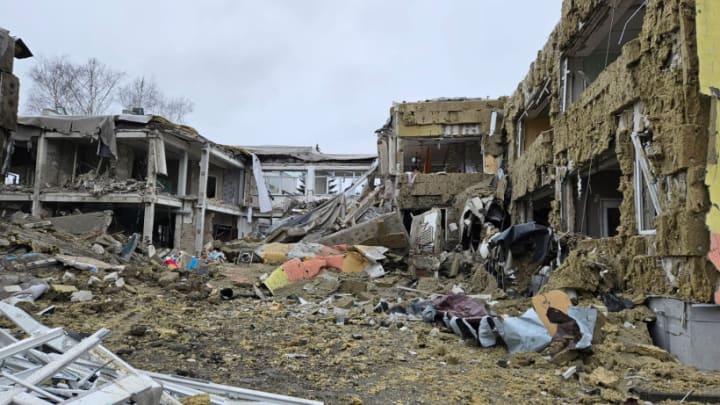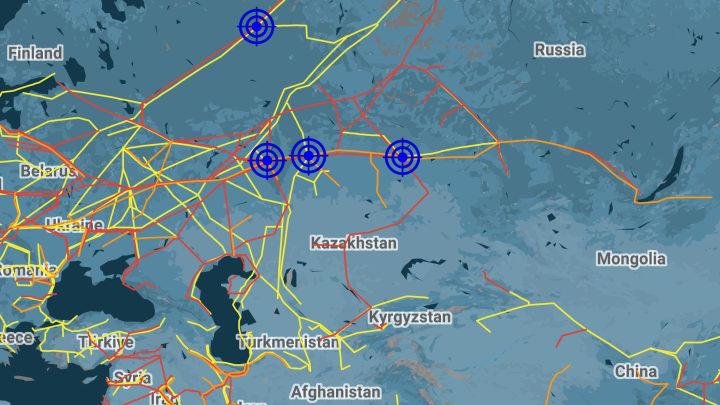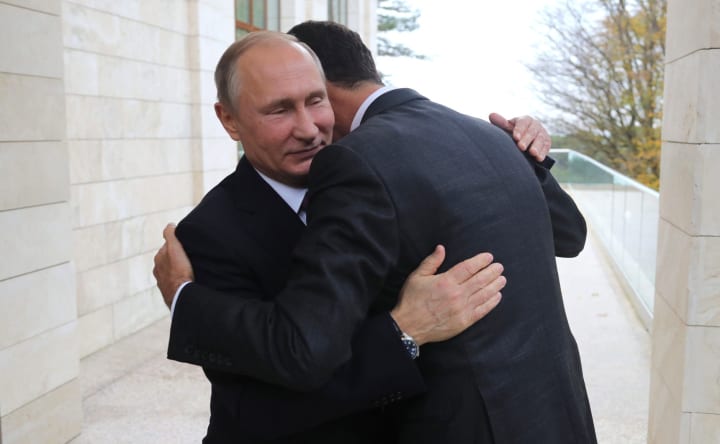
As Russia's protracted war of aggression against neighbor Ukraine entered its third year in February 2024, there was nothing particularly substantial to report. Shortly before that occasion, though, then-Ukrainian President Volodymyr Zelenskyy had sacked and replaced the head of his armed forces, ostensibly because they did not see eye-to-eye on how to proceed with the conflict and make any gains. True to this analysis, the hostilities had devolved into stagnation and attrition, with neither side able to attain any significant victories. Even the populace of Ukraine began to show signs of fatigue with the continual fighting—despite the fact that defeat would mean, at best, occupation and, at worst, genocide. According to a Gallop poll of Ukrainian citizens conducted in the summer of 2023, the following attitudes were expressed in relation to what was to be done (with a comparison to their answers from 2022 in parenthesis):
- Battle Until Victory: 60% (▼ 70%)
- Negotiate a Conclusion ASAP: 31% (▲ 26%)
- No Idea: 7% (▲ 3%)
More so, the closer to the front lines these people lived, the less likely they were to want to maintain hostilities, bottoming out at 45%. Meanwhile, across the rest of the world, the appetite for supporting Ukraine had diminished. Governments became paralyzed while attempting to pass aid, which in turn fueled souring public sentiment within those nations. Ukraine's future as an independent, free, and secure country certainly appeared bleak. Most of all, it looked lonely. So long as Ukraine persisted upon using traditional warfare, it did not seem like there was going to be an end to their struggle at any point in the near future.
But why should Ukraine—or really any country or people that might have found themselves under attack from a hostile force intent on their destruction—have prolonged adhering to the so-called "Laws of Armed Conflict"? What were they accomplishing if they followed these rules but still ended up defeated and/or dead? Would a moral victory of knowing they "did things the proper way" give them any comfort if the despots achieved total victory in the end? Or, to put it simply:
Would they rather have done the right thing, or won?
Nevertheless, in order to succeed without solely relying upon conventional methodologies, there was only one thing left in their arsenal. Triumph could only be realized through terrorism.
Abduction and Human Shields
Sticking with using Ukraine as an example, one of the core issues they had to contend with was Russia bombing civilian infrastructure. This had included apartment buildings, homes, businesses, houses of worship, convention halls, shelters, historic landmarks, power plants, and plenty more. Although Russia claimed that they did not target any of these and only went after "legitimate military targets", the evidence against this pronouncement was overwhelming. For its part, Ukraine had been begging its western and other allies to provide advanced jet planes and counter-projectile systems in order to repel these particular attacks. In spite of these pleas, not much was made available to Ukraine, meaning that they only had very basic options to prevent such assaults.
But without sophisticated weaponry, what other choice did Ukraine have but to endure these never-ending strikes?

To resolve that question, it first needs to be reframed into a new paradigm:
What could have stopped Russia from wanting to bomb Ukrainian civilian targets?
The answer is that there needed to be something that Russia would have wanted to see protected, something they valued. Unfortunately, there was nothing within Ukraine that Russia truly desired, not even the inhabitants. Still, that did not mean Russia lacked an ability to care about people as a general concept; they did, theoretically, it was just that their penchants were directed towards exclusively protecting their own population. As such, that was the key. Specialized Ukrainian intelligence units could have surreptitiously penetrated across the border and sought out the spouses, children, and other family members of the politicians, military commanders, bomber pilots, and drone operators, absconding with them back to Ukraine. Once there, they could have scattered the hostages all over the country, embedding them into civilian institutions of all kind. This accomplished, the government could have made it very publicly known what had been undertaken, but without revealing any pertinent details like the exact number of hostages and precisely where they might have been kept.
With the abducted relatives of those who might do them harm placed in this way, they would have then become human shields. Attacking anywhere in Ukraine would have put the Russian soldiers' own blood at risk. Ordering someone to annihilate a structure that may have contained a loved one would have been an impossible request, one that potentially could have resulted in mass insubordination. In a perfect world, it could also have spurred on a coup d'état and the deposing of Russia's then-strongman leader Vladimir Putin, thus ending the conflict once and for all.
And to be exceptionally clear, this strategy would have been a war crime as defined under many international treaties like the Third and Fourth Geneva Conventions. Specifically, the Rome Statute of the International Criminal Court (ICC) said that “utilizing the presence of a civilian or other protected person to render certain points, areas[,] or military forces immune from military operations” would be a prosecutable offense. That said, at that time, Ukraine—like Russia, the United States and more than thirty other nations—had not acknowledge the ICC's jurisdiction. Even if they had, this tactic would have been too valuable of an opportunity to pass up. Since Russia was already ignoring all their obligations under those prior agreements, what was Ukraine obtaining by continuing to adhere to them? Ukraine aspired to save the lives of their own citizenry from an aggressor who did not care about any decrees against their activities, therefore they would have been well within their rights to respond in kind.
Regrettably, undertaking a dastardly deed like this might also have inspired Russia to do the same with Ukrainian civilians, especially the displaced children and prisoners of war they already possessed. However, even if they had done so, it would not have affected the equation on the Ukrainian side because they supposedly had no interest in Russian territory, only seeing Russia removed from their own. Instead, the ensuing détente could have eventually led to formal negotiations, bringing a political end to the war.
Environmental and Economic Devastation
Yet, perhaps, for some people and governments, the idea of having ensnared "uninvolved" civilians would have been far too much of a moral quandary, or too risky to have undertaken in the first place. For those individuals, they may have wanted to have had any retaliatory action been directed squarely at the enemy. But what could have been done if their opponent was multiple times larger and had access to vast resources, as was the case with Russia in comparison to Ukraine?
As a nation on the defense and barely holding the line, Ukraine could hardly spare capital towards reaching Russian zones adjacent to their own country, nonetheless undertaking a direct assault against any significant site deep within Russian territory. On the other hand, terrorists worldwide who have prevailed in their attacks have not usually been organized in rigid battalions with hierarchical oversight. Contrary, they have acted in small, autonomous cells so that they could not be easily penetrated. Importantly, it also meant that if one were taken down, it did not lead to the rest of the network being disassembled because of it. With each cell completely siloed and freestanding, the terrorists were able to continue their plans mostly unabated.
This is an approach that Ukraine could also have undertaken. For what Ukraine lacked in weaponry, manpower, and other assets, they could have more than made up using an option that was readily available to them: the ability to hide in plain sight. Among the over forty million people who were a part of Ukrainian society, a significant portion were native Russian speakers—often having been descended from Russians or immigrants themselves after the breakup of the Soviet Union. Combine that with access to captured Russian uniforms, vehicles, and more, and small Ukrainian cells dressed and acting as their Russian counterparts could have made their way into Putin's domain. Importantly, they could have come from multiple directions, even taking boats to the other side of Russia and starting a long overland journey to their destinations.
The only thing they would have needed would have been some targets. What should those have been? What would actually have impacted Russia to the point where they might not have been able to continue their invasion of Ukraine and be forced to retreat?

Despite western sanctions and European countries making concerted efforts to move away from Russian-sourced oil and gas, proceeds from the sale of these fossil fuels accounted for around 28% of the Russian budget in 2023, according to Reuters. If someone truly wanted to cripple the Russian economy, finding a way to remove nearly a third of their funding would have been an ideal place to start. As shown in the map above, there were a number of pipelines that moved these commodities not only within Russia, but out to the rest of the world. Among those, there were several critical junctures where various major routes came together and split apart. Setting explosive charges at these positions would have been a way to stop the money from flowing back into Putin's coffers.
Doing so would certainly have resulted in not only an economic disaster, but also an environmental one. Energy products would have liberally spilled out onto the ground and poisoned the water; that is, before Russian officials and experts would have been able to eventually stop the flood. That said, though, the situation would only have been a temporary setback. A standard bomb might have been able to destroy the physical infrastructure, but given even a short amount of time—like a few months—Russia could have repaired the damage and gotten back to what they were doing beforehand. That is why if Ukraine really wanted to make sure that Russia could not easily have revived this advantage, it would have been necessary to have done something that most terrorists organizations had only dreamed about deploying: radioactivity.
No, Ukraine did not have access to nuclear weapons, having transferred the entirety of the inventory that remained in their territory after the dissolution of the Soviet Union out to Russia by 2001. As a matter of fact, according to the International Campaign to Abolish Nuclear Weapons (ICAN), Ukraine "joined the Nuclear Non-Proliferation Treaty as a non-nuclear weapon state in 1994." The country simply did not have access to fission or fusion arsenal of any kind, nor would they have needed to. Within the region it controlled at the time, Ukraine already had three viable and functional nuclear power plants, which in turn produced tons of radioactive waste. That would have been the real prize.
As an alternative to just using common explosives, Ukraine could have mixed in that radioactive byproduct, thus creating a "dirty bomb". That would have made the entire area around the pipes completely unapproachable and unlivable until it was cleaned up, a process that most likely would have taken decades. Of course, the ecological fallout would have been just the beginning. There were many countries, even European ones, that were still almost entirely dependent upon Russian fuel and would not have been too keen on being cut off in this manner. But again, it would have come down to one query:
What did Ukraine want more: placating places like Hungary, China, and India into being, at best, cold allies; or stopping Russia from killing their own people and seizing their land?
It is worth noting that Ukraine's first duty—as it would have been with any other country in a similar position—would have been the safeguarding of its citizenry above all other considerations. If it meant that the rest of Europe would have had to pay higher energy prices and that Ukraine would have made significant portions of Russia uninhabitable for humans and all other life, then that is the sacrifice they should have been willing to make. What would have been the point of having happy friends if they were not alive to see it? And would it have mattered if they made a few additional enemies out of locales that were already not supporting them?
Intentionally Spreading the Conflict
Therein lies another possibility that Ukraine could have undertaken. Pan-American, European, and Asian-Pacific countries had all duly expressed that they did not want to see the conflict in Ukraine spread to the rest of the world. Ukraine had been quite compliant in that request, too, hoping it would help spur the cooperation and patronage of those nations through other means. Regardless of this stance, plenty of states still refused to provide material assistance—and often had trouble even offering verbal backing. One of the most notable among this conglomerate was Israel.
The reason why Israel had such difficulty was because Russia controlled the skies of Syria, a country Israel was still technically at war with. Desiring to maintain their freedom to act against targets in Syria—notably ones related to the Iranian military and their affiliates like Hezbollah—Israel was forced to work with Russia. This relationship was maintained even after Iranian-sponsored Hamas forces in Gaza unleashed a devastating attack against Israel on October 7, 2023. In the aftermath of this violent assault, Vladimir Putin not only decreed that Hamas was not a terrorist organization, but actually hosted officials from their political wing in Moscow.

Based upon these particulars, it would have seemed like Israel and Ukraine should have been natural allies. Russia supported Israeli rivals like Syria, Hamas, Hezbollah, and Iran, the latter of whom was providing weaponry like suicide drones that were used in Ukraine. But that singular condition of not wanting to antagonize Russia when they were so embedded in Syria kept Israel at bay, leaving Ukraine alone and unable to team up with Israel to defeat their common foes. What could Ukraine have done to change this equation and gain a heretofore reluctant ally?
The answer would have been relatively simple: Ukraine could have launched a surprise strike on Russian forces in Syria, hopefully decimating them. Although Syria had nothing to do with Russia's atrocious activities in Ukraine, this tactic would not only have given Israel culpability to deny their involvement and avoid an immediate Russian retribution, but would have freed them to finally act as they truly wanted to.
Would this have turned two seemingly separate regional conflicts into a world war and dragged many others along with them? Yes, it most likely would have turned out that way. For Ukraine, though, that is what they needed. If the rest of the world was not going to come along voluntarily, then they should have been willing to drag them into the campaign kicking and screaming. Again, it should not have mattered to them what others thought or desired, only if particular actions would have resulted in the saving of their country and their people. That was the only relevant math.
When War is Necessary
"War should be avoided at all costs" is a common parlance among those who believe humanity can solve their problems without violence. While the latter sentiment may be true in an ideal world, the Earth is far from reaching that lofty goal. In the meantime, is "all costs" even a valid measurement, anyway? Vladimir Putin has said that there would have been no war in Ukraine if they would have just surrendered to him from the onset, or if the west would have stopped supplying them with arms so they could not have continued to fight back against him. From a technical standpoint, he was absolutely correct. Would sacrificing an entire nation and a culturally distinct people be a cost worth paying just to avoid further bloodshed?
Ukraine did not seek war; it was thrust upon them. They tried for over two years to do things "by the book" and push Russia out of their territory without causing too much distress for the rest of the world, not even to Russia itself. No matter these efforts, they were not enough. How much should one country, one people, one single individual have been expected to endure before the solution became doing the most horrific acts in order to have finally, maybe, ended the torture and bring about some semblance of peace? To quote Lieutenant Commander Data in the Star Trek: The Next Generation episode The High Ground:
[W]ould it be accurate to say that terrorism is acceptable when all options for peaceful settlement have been foreclosed?
Well, would it?

J.P. Prag is the author of several works, including the political, cultural, scientific, and humanist collection Always Divided, Never United: And Other Stories During a Time of Pandemics and Politics, available at booksellers worldwide. Learn more about him at www.jpprag.com.

It was an age defined by a potentially apocalyptic situation running rampant, a partisan and dogmatic ruling class refusing to listen to anyone beyond the loudest voices in the mob, and truth and understanding lingering frustratingly out of reach.
But was it really that different than any other point in history?
Can the leader of a nation ever have a genuine mandate? Are the actions of certain lawmakers actually treasonous? Do religious beliefs supersede all other rights? Does progress always mean giving something else up? When will things finally improve? Or was it better in the past?
These are but a handful of questions explored in...
ALWAYS DIVIDED, NEVER UNITED
AND OTHER STORIES DURING A TIME OF PANDEMICS AND POLITICS
About the Creator
J.P. Prag
J.P. Prag is the author of "Aestas ¤ The Yellow Balloon", "Compendium of Humanity's End", "254 Days to Impeachment", "Always Divided, Never United", "New & Improved: The United States of America", and more! Learn more at www.jpprag.com.






Comments
There are no comments for this story
Be the first to respond and start the conversation.